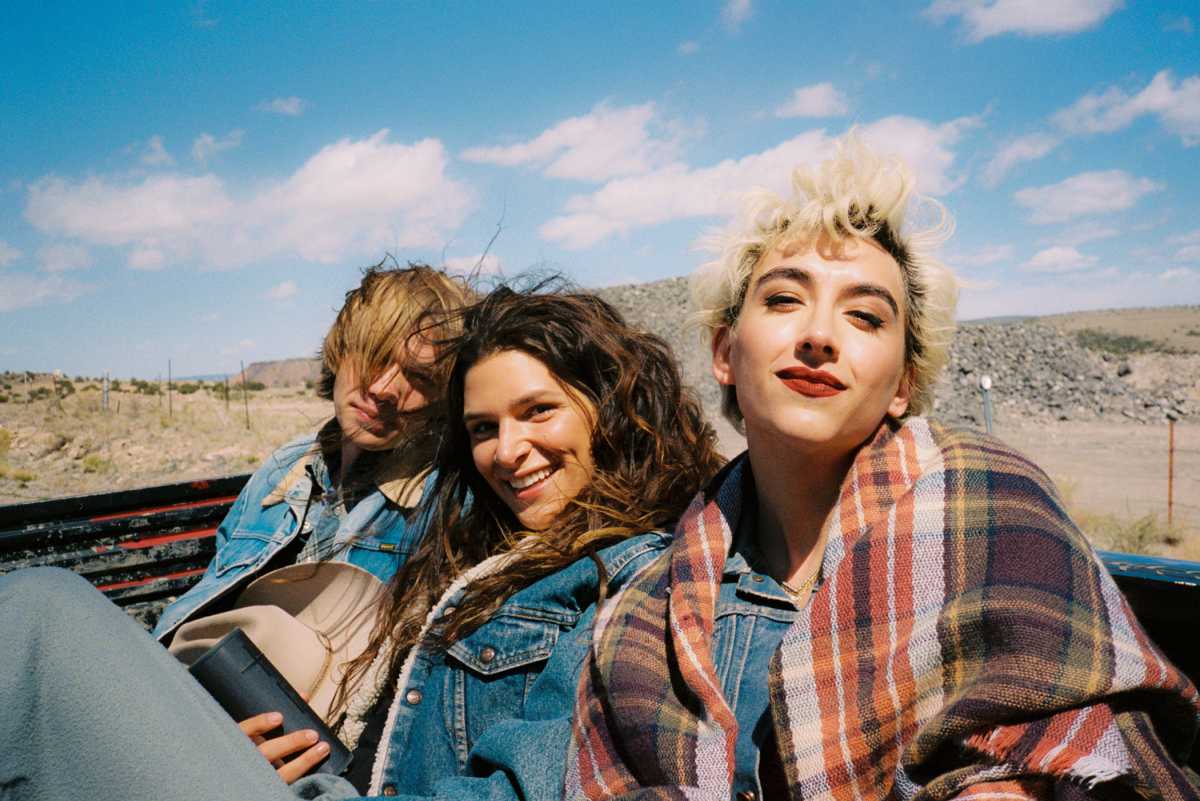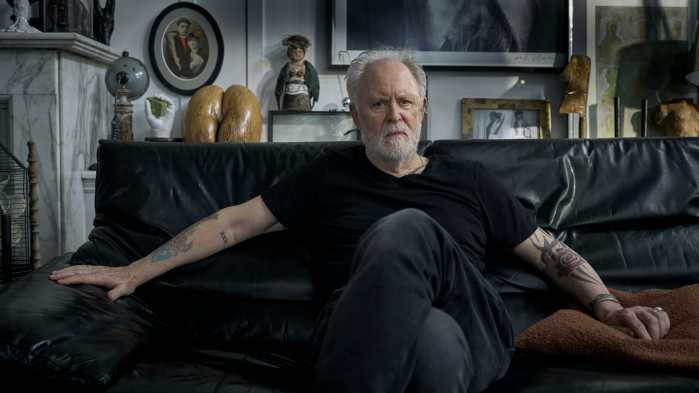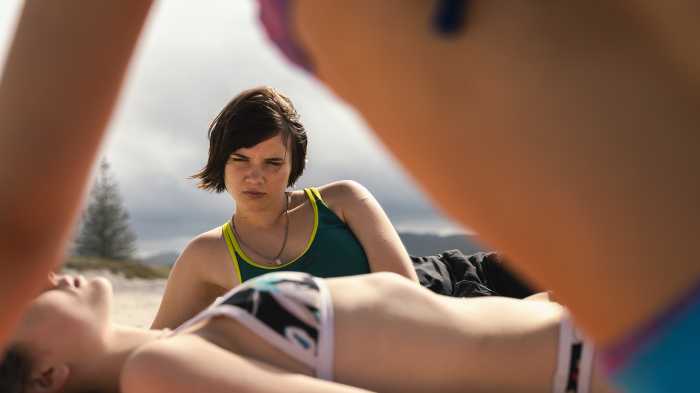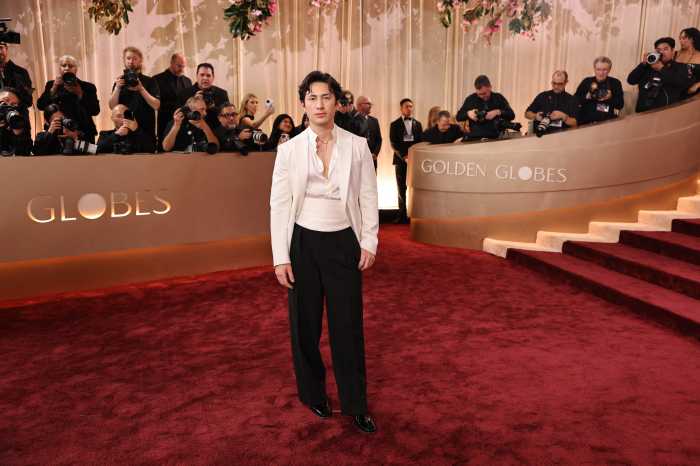Luke Gilford makes an auspicious directorial debut with the sweet and emotional drama, “National Anthem.” Dylan (Charlie Plummer) is a taciturn young man who takes a job at “The House of Splendor,” a queer ranch. He meets Sky (Eve Lindley), and quickly falls for her. While Sky is in an open relationship with Pepe (Rene Rosado), the undeniable attraction she feels for Dylan prompts her to pursue him and coax him out of his shell.
At the ranch, Dylan is also guided by the genderqueer Carrie (Mason Alexander Park), a drag queen and mother figure who teaches him life lessons as he finds himself and “finds his people.” Carrie helps Dylan test the waters with wigs and makeup, mushrooms, and doing drag.
Gilford, who published a book of photographs entitled “National Anthem” that was the basis for the film, spoke with Gay City News about making his first feature.
Can you talk about the process of adapting your book for a film?
One of the most beautiful gifts that photography taught me was how to tell a story with facial expressions, and how much nuance is in the face. I really believe faces tell stories. That’s something I really worked on in the film. Going from photography to writing and then directing a film are almost like two different sides of the brain — making an iconic still image to telling a meaningful story is a very different process. I’ve had a lot of practice with visual storytelling, going from photography to music videos to shorts. Working on the performances and the writing were the two biggest priorities for me of transitioning from photography to filmmaking
What can you say about creating the dynamic between Sky and Dylan? There is a real chemistry, but also some tension given her relationship with Pepe.
It was important to build out that scene because a lot of folks think it is going to be her “disclosure moment” about her identity. Dylan and Sky are in the barn and about to have sex, and she stops it and says, “I want to make sure you know my deal,” and he says, “What do you mean, I know your deal,” and she says, “No, not that. I mean Pepe,” and she explains to him the [open relationship] situation. That was important to me for many reasons. I wanted to make sure I never overtly disclose her gender identity on screen. It think it is a tired trope and to subvert that and have it more about the three-way relationship and make him understand what he’s getting into. I wanted to have a more realistic depiction of open relationships, too. It wasn’t like Pepe was an angry boyfriend. There are things he liked about Dylan too, but he was also, “You can’t stay here forever, bro.” At every turn of the writing process there were so many potential cliches — the alcoholic mother, the kid in danger, the three-way relationship, trans characters. There was so much potential for leaning on cliches it was a priority for me to avoid those at every turn and represent something more nuanced and real and modern. Yes, it’s a Western but it is also for the new world we’re living in.
What can you say about filming the rodeo scene and the drag performances? These episodes, among others, play with issues of masculinity and femininity.
It’s very much informed by my many years in this subculture. I wanted to accurately dignify this world on screen and share it in an authentic light. We were at real rodeos for all those scenes. It was important to me to not recreate any rodeos. We were there with real people and the real community. What you are seeing is it. That fluidity exists in real life. I am so inspired by it.
Carrie is arguably my favorite character, because they are the film’s voice of reason. What inspired their role?
I really wanted Carrie to counteract Dylan’s biological mother and for them to be the mother figure at the ranch, welcome him in, teach him, and be that mother he doesn’t have at home. It was challenging to cast Carrie. I wanted a real drag queen, who had that authenticity, but as I was auditioning, so many of them are so trained to be so over the top and not grounded the way this character is. It was important Carrie was soulful and grounding for Dylan. We found Mason Alexander Park on Broadway, and they had such a gravitas.
“National Anthem” is a very positive portrait of queer life in the American West, with no moments of homophobia or transphobia. Can you talk about that aspect of the film?
All rural queer stories — from “Brokeback Mountain” and “Boys Don’t Cry” and “The Matthew Shephard Story” — are all tragedies. It is so scary and terrifying for queer people every day. I wanted to depict something that focuses on queer joy and celebration and love that exists in this community. It’s important to have that beacon of hope. This is a real community and a real safe space that exists. It is not a fantasy. It’s very important for people to know this is a real subculture, and to be reminded that this is an option for people to find their people and create these safe spaces. It was very much a conscious choice to share this and not focus on the trauma and darkness that exists out there but to show the sense of belonging and celebratory joy.
“National Anthem” | Directed by Luke Gilford | Opening July 12 at the Angelika Film Center | Distributed by LD Entertainment



































